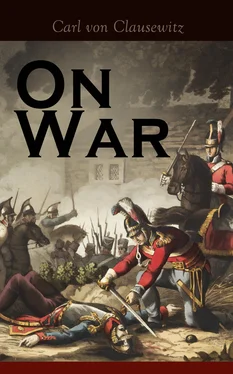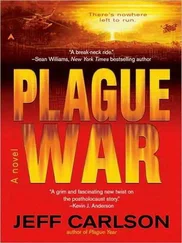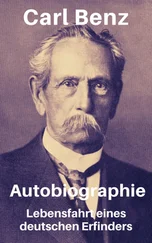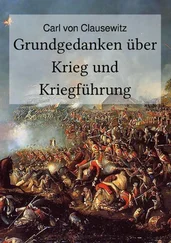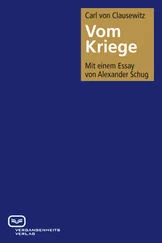24. WAR IS A MERE CONTINUATION OF POLICY BY OTHER MEANS.
We see, therefore, that War is not merely a political act, but also a real political instrument, a continuation of political commerce, a carrying out of the same by other means. All beyond this which is strictly peculiar to War relates merely to the peculiar nature of the means which it uses. That the tendencies and views of policy shall not be incompatible with these means, the Art of War in general and the Commander in each particular case may demand, and this claim is truly not a trifling one. But however powerfully this may react on political views in particular cases, still it must always be regarded as only a modification of them; for the political view is the object, War is the means, and the means must always include the object in our conception.
25. DIVERSITY IN THE NATURE OF WARS.
The greater and the more powerful the motives of a War, the more it affects the whole existence of a people. The more violent the excitement which precedes the War, by so much the nearer will the War approach to its abstract form, so much the more will it be directed to the destruction of the enemy, so much the nearer will the military and political ends coincide, so much the more purely military and less political the War appears to be; but the weaker the motives and the tensions, so much the less will the natural direction of the military element—that is, force—be coincident with the direction which the political element indicates; so much the more must, therefore, the War become diverted from its natural direction, the political object diverge from the aim of an ideal War, and the War appear to become political.
But, that the reader may not form any false conceptions, we must here observe that by this natural tendency of War we only mean the philosophical, the strictly logical, and by no means the tendency of forces actually engaged in conflict, by which would be supposed to be included all the emotions and passions of the combatants. No doubt in some cases these also might be excited to such a degree as to be with difficulty restrained and confined to the political road; but in most cases such a contradiction will not arise, because by the existence of such strenuous exertions a great plan in harmony therewith would be implied. If the plan is directed only upon a small object, then the impulses of feeling amongst the masses will be also so weak that these masses will require to be stimulated rather than repressed.
26. THEY MAY ALL BE REGARDED AS POLITICAL ACTS.
Returning now to the main subject, although it is true that in one kind of War the political element seems almost to disappear, whilst in another kind it occupies a very prominent place, we may still affirm that the one is as political as the other; for if we regard the State policy as the intelligence of the personified State, then amongst all the constellations in the political sky whose movements it has to compute, those must be included which arise when the nature of its relations imposes the necessity of a great War. It is only if we understand by policy not a true appreciation of affairs in general, but the conventional conception of a cautious, subtle, also dishonest craftiness, averse from violence, that the latter kind of War may belong more to policy than the first.
27. INFLUENCE OF THIS VIEW ON THE RIGHT UNDERSTANDING OF MILITARY HISTORY, AND ON THE FOUNDATIONS OF THEORY.
We see, therefore, in the first place, that under all circumstances War is to be regarded not as an independent thing, but as a political instrument; and it is only by taking this point of view that we can avoid finding ourselves in opposition to all military history. This is the only means of unlocking the great book and making it intelligible. Secondly, this view shows us how Wars must differ in character according to the nature of the motives and circumstances from which they proceed.
Now, the first, the grandest, and most decisive act of judgment which the Statesman and General exercises is rightly to understand in this respect the War in which he engages, not to take it for something, or to wish to make of it something, which by the nature of its relations it is impossible for it to be. This is, therefore, the first, the most comprehensive, of all strategical questions. We shall enter into this more fully in treating of the plan of a War.
For the present we content ourselves with having brought the subject up to this point, and having thereby fixed the chief point of view from which War and its theory are to be studied.
War is, therefore, not only chameleon-like in character, because it changes its colour in some degree in each particular case, but it is also, as a whole, in relation to the predominant tendencies which are in it, a wonderful trinity, composed of the original violence of its elements, hatred and animosity, which may be looked upon as blind instinct; of the play of probabilities and chance, which make it a free activity of the soul; and of the subordinate nature of a political instrument, by which it belongs purely to the reason.
The first of these three phases concerns more the people the second, more the General and his Army; the third, more the Government. The passions which break forth in War must already have a latent existence in the peoples. The range which the display of courage and talents shall get in the realm of probabilities and of chance depends on the particular characteristics of the General and his Army, but the political objects belong to the Government alone.
These three tendencies, which appear like so many different law-givers, are deeply rooted in the nature of the subject, and at the same time variable in degree. A theory which would leave any one of them out of account, or set up any arbitrary relation between them, would immediately become involved in such a contradiction with the reality, that it might be regarded as destroyed at once by that alone.
The problem is, therefore, that theory shall keep itself poised in a manner between these three tendencies, as between three points of attraction.
The way in which alone this difficult problem can be solved we shall examine in the book on the “Theory of War.” In every case the conception of War, as here defined, will be the first ray of light which shows us the true foundation of theory, and which first separates the great masses and allows us to distinguish them from one another.
4.Clausewitz alludes here to the “Wars of Liberation,” 1813, 14, 15.
5.It must be remembered that all this antedates by some years the introduction of long-range weapons.
CHAPTER II.
Ends and Means in War
Table of Contents
Having in the foregoing chapter ascertained the complicated and variable nature of War, we shall now occupy ourselves in examining into the influence which this nature has upon the end and means in War.
If we ask, first of all, for the object upon which the whole effort of War is to be directed, in order that it may suffice for the attainment of the political object, we shall find that it is just as variable as are the political object and the particular circumstances of the War.
If, in the next place, we keep once more to the pure conception of War, then we must say that the political object properly lies out of its province, for if War is an act of violence to compel the enemy to fulfil our will, then in every case all depends on our overthrowing the enemy, that is, disarming him, and on that alone. This object, developed from abstract conceptions, but which is also the one aimed at in a great many cases in reality, we shall, in the first place, examine in this reality.
Читать дальше
